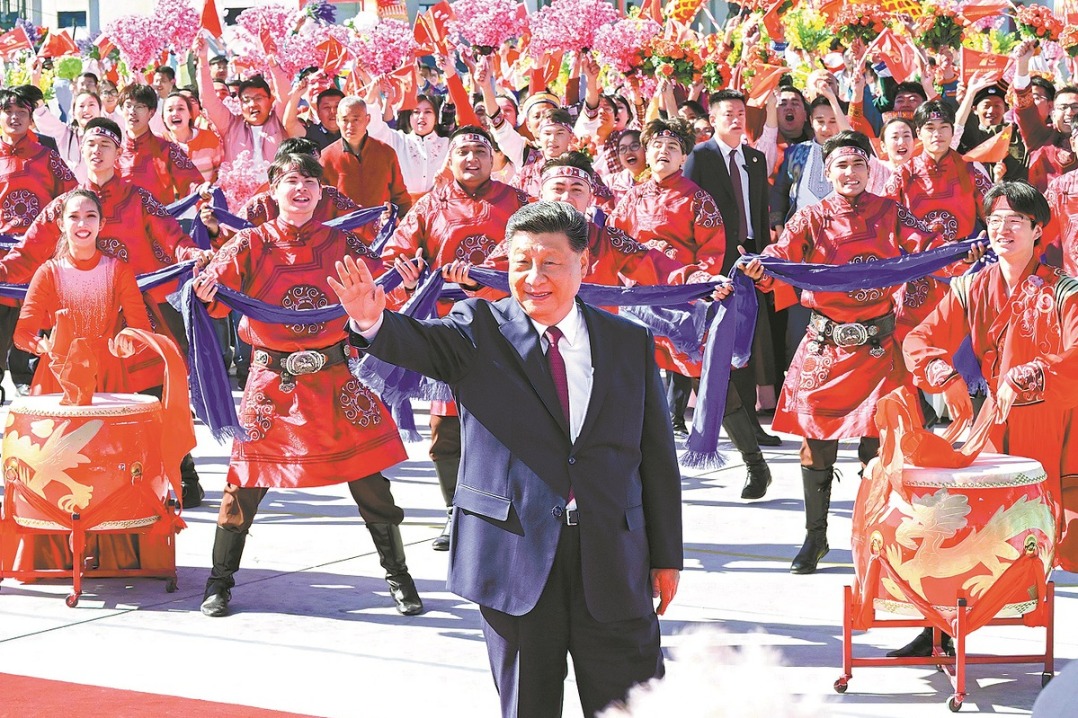Warped intent


IPEF is designed to weaken China's economic growth by excluding the country from global supply chains
The "Indo-Pacific" supply chain deal that came into effect on Feb 24 has the hallmarks of a continued effort to hinder China's economic development. It follows the largely symbolic gesture of goodwill by 12 countries when they signed up to the "Indo-Pacific" Economic Framework for Prosperity proposed by US President Joe Biden during the 2022 APEC meeting.
The deliberate exclusion of China and the development of new rules are clearly designed to make it more difficult to conduct trade with China.
The IPEF consists of four pillars — trade, supply chains, clean energy, decarbonization, and infrastructure — and tax and anti-corruption. The recent manipulation of issues around supply chains threatens to undermine the objectives of the remaining three pillars.
The original gesture of goodwill by members may have come back to bite them as the IPEF is under increasing pressure to endorse and support efforts by the United States to distort the global supply chains.
It certainly makes sense for countries to diversify their supply chains but this is usually taken to mean sourcing products from multiple sources rather than attempting to cut one supplier out of the supply chain. As a major supplier of global goods, China was excluded from the IPEF discussions, which was already an indication of the agreement's true objective.
When the US Department of Commerce talks of establishing a framework for deeper collaboration to prevent, mitigate and prepare for supply chain disruptions, such as those experienced in recent years from the COVID-19 pandemic, what it really seems to mean is it wants the IPEF signatories to reduce their trade with China.
The pressure being imposed on the other IPEF members by the US replicates the pressure already being imposed on Japanese and Korean chip manufacturers to stop servicing and providing chipmaking equipment to China.
For the IPEF members, this policy has two elements.
The first element is to deny China access to the equipment, semiconductors and goods it needs to continue to make technological advances. This lies at the heart of Washington's Chips Act. This has nothing to do with enhancing supply chain resilience and everything to do with slowing China's technological advances.
The supply chain disruption in this area is created by the US and imposed on the other IPEF members who are threatened with various forms of commercial punishment should they break these US-imposed restrictions.
The second element is to fund the development of substitutes for some Chinese exports, particularly rare earths. For any commodity, scarcity and price changes encourage wider exploration and marginal producers become profitable, so the supply chain expands.
However, the IPEF supply chain resilience in this area is distorted by a policy of subsidies, tariffs, political pressure and de-facto sanctions. Existing companies are excluded from some supply contracts and investment incentives if they have Chinese interests on their shareholder register or are committed to sending some of their offtake to China.
The US is asking the other IPEF members to endorse a policy of economic containment rather than working toward a broader opening-up of supply chain alternatives. The policies around rare earths tighten the grip on these supply chains because access and development are left to the whims of the US and its domestic needs.
These IPEF decisions disrupt global supply chains rather than enhancing them. The global supply chains are disrupted, and markets distorted to enhance US global objectives which are designed to limit China's opportunities for economic growth and reinvigoration of China's export markets.
Chinese Foreign Minister Wang Yi, also a member of the Political Bureau of the Communist Party of China Central Committee, highlighted these impacts when discussing Washington's sanctions on China, which include restrictions on its access to chip technology.
"The US has been devising various tactics to suppress China and lengthen its unilateral sanction list, reaching a bewildering level of unfathomable absurdity," he said. "If it persistently monopolizes the high end of the value chain and keeps China at the low end, where is fairness in competition?"
Asian supply chain stability and sustainable development are key issues in the Australia-China relationship. The Australian rare earths industry is enabled by long-term Chinese investment and expertise, particularly when it comes to processing offtake. How Australia reacts to the IPEF and US pressure to impose non-commercial conditions on this investment will be an important barometer of Australia's commitment to improving its relationship with China. Forcing companies to divest their Chinese investors and to redirect offtake agreements to less favorable US markets under the guise of security concerns will destroy China's confidence in Australian investment.
When it comes to the other three IPEF pillars, Australia and other members must resist any efforts to turn these areas into attacks on China. Their response to proposals by Europe and the US to impose restrictions on green energy products and excessive tariffs on electric vehicles from China will be an important litmus test of the true purposes of the IPEF.
Dominated and directed by the US and its allies, the IPEF is in danger of becoming an instrument that disrupts global supply chains to further US policy objectives designed to weaken China's economic growth.
The author is an international financial technical analysis expert and a former national board member of the Australia China Business Council. The author contributed this article to China Watch, a think tank powered by China Daily. The views do not necessarily reflect those of China Daily.
Contact the editor at editor@chinawatch.cn.


































